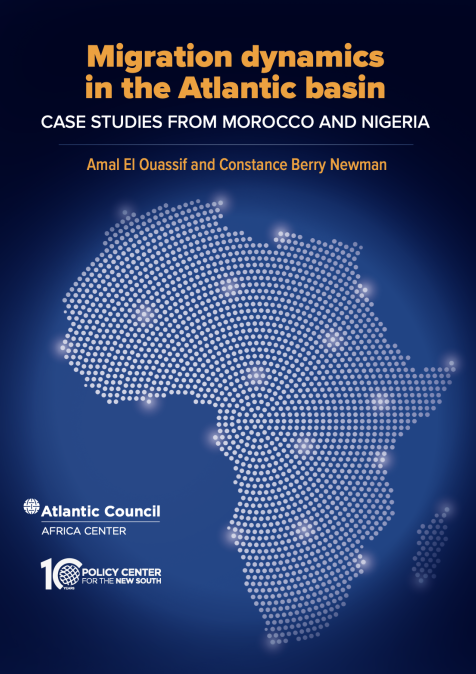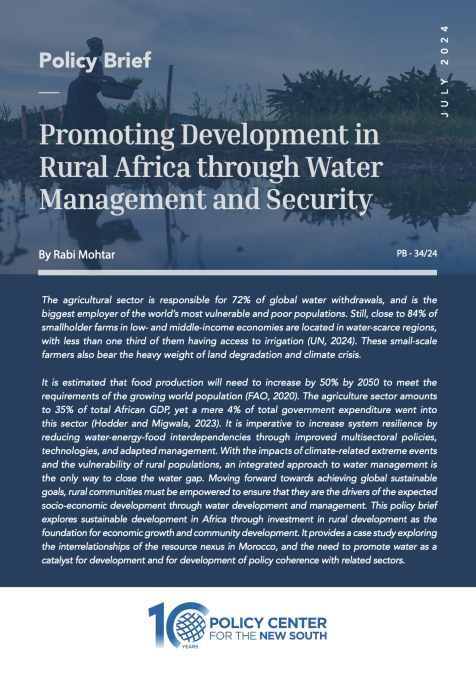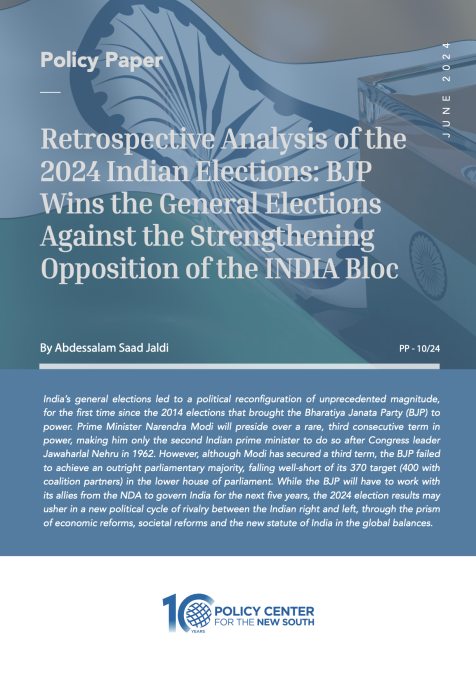Paul-Simon Handy, Regional Director for East Africa and Representative to the African Union, delves into the complexities of mediation in internal African conflicts. Despite half of the UN peacekeeping forces being deployed on the African continent, sustainable peace remains elusive. Mr Handy explores the reasons behind these challenges, shedding light on the intricate dynamics and obstacles that hinder effective conflict resolution.
RELATED CONTENT
-
July 9, 2024يشكل التطور السريع في مجال الذكاء الاصطناعي تحديًا كبيرًا في سوق الشغل. تشير الإحصائيات إلى أن حوالي 40% من الوظائف العالمية قد تتأثر بالذكاء الاصطناعي، وأن ما يقرب من نصف المهارات الأساسية المطلوبة في الشركات اليوم ستشهد تغييرات. فإلى أي مدى يستعد سوق العمل في المغرب للتكيف مع هذا الوا...
-
Akram Zaoui, Dominique Bocquet, Otaviano Canuto, Paul IsbellJuly 05, 2024Many observers have commented on the similarities that the Foreign Policies of the Biden and Trump administration have in common, oftentimes considering that the key differences lie in st ...
-
July 4, 2024In this episode, we explore pathways to enhance women's participation in mediation and peace processes to ensure their voices are integral to conflict resolution and peacebuilding efforts. Miss Loredana Teodorescu shares insights on strategies to overcome cultural and structural barrier...
-
AuthorsConstance Berry NewmanJuly 2, 2024Immigration has never been without tensions. In the United States, immigration remains a contentious issue that now, more than ever, dominates election campaigns. A 727-kilometer wall has been constructed on the US-Mexico border to halt the influx of migrants from the south. In Europe, the rise of far-right parties over the past twenty years has culminated in them becoming a major political force in the European Parliament ahead of the June 2024 elections. The tension around immigr ...
-
AuthorsJuly 2, 2024The agricultural sector is responsible for 72% of global water withdrawals, and is the biggest employer of the world’s most vulnerable and poor populations. Still, close to 84% of smallholder farms in low- and middle-income economies are located in water-scarce regions, with less than one third of them having access to irrigation (UN, 2024). These small-scale farmers also bear the heavy weight of land degradation and climate crisis. It is estimated that food production will need to ...
-
AuthorsAziz AjbilouJuly 1, 2024This article aims at studying the changes in fertility rates in Morocco over time using available data from censuses and surveys conducted by High Commission for Planning (HCP), Ministry of Health, and National Observatory for Human Development (ONDH). Since 2010, fertility has shown a kind of stagnation or even a slight increase. This trend is more pronounced in urban areas, where the fertility rate for urban women was 1.8 children per woman in 2010, rose to 2.2 children per woman ...
-
Fadila Filali, Fatimata BaJune 28, 2024Les zones humides en Afrique sont des écosystèmes uniques et vitaux qui offrent une multitude de services écologiques, économiques et sociaux. Elles abritent une biodiversité contribuant ...
-
AuthorsJune 28, 2024India’s general elections led to a political reconfiguration of unprecedented magnitude, for the first time since the 2014 elections that brought the Bharatiya Janata Party (BJP) to power. Prime Minister Narendra Modi will preside over a rare, third consecutive term in power, making him only the second Indian prime minister to do so after Congress leader Jawaharlal Nehru in 1962. However, although Modi has secured a third term, the BJP failed to achieve an outright parliamentary maj ...
-
AuthorsZineb FaidiJune 27, 2024Nigeria’s cultural and creative industries (CCIs) illustrate the dynamic interplay between cultural production and economic growth. Through Nollywood and Afrobeat, Nigeria has effectively leveraged its creative capital to strengthen its economy and broaden its global cultural influence. These sectors show how local cultural elements can be blended with universal themes, achieving widespread resonance. Beyond their economic contributions, these industries play crucial roles in cultur ...
-
 AuthorsJune 27, 2024The earth’s average surface temperature in May 2024 was higher than any other May on record, marking the twelfth consecutive such record-breaking month. According to the European Union’s Copernicus Climate Change Service, May’s temperature was 1.52 degrees Celsius above the pre-industrial average, while temperatures over the past twelve months have averaged 1.63°C above (Figure 1). Global sea surface temperatures have also set records over the past fourteen months. Consider the e ...
AuthorsJune 27, 2024The earth’s average surface temperature in May 2024 was higher than any other May on record, marking the twelfth consecutive such record-breaking month. According to the European Union’s Copernicus Climate Change Service, May’s temperature was 1.52 degrees Celsius above the pre-industrial average, while temperatures over the past twelve months have averaged 1.63°C above (Figure 1). Global sea surface temperatures have also set records over the past fourteen months. Consider the e ...








